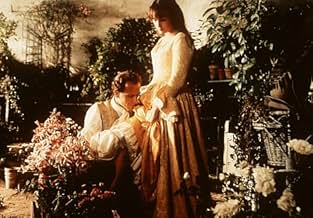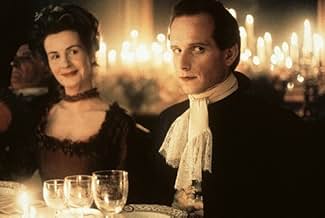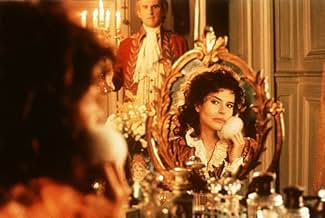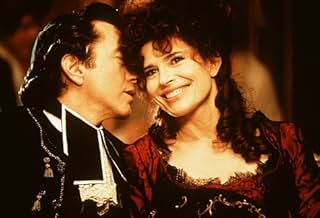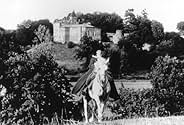Ridicule
- 1996
- Tous publics
- 1h 42m
IMDb RATING
7.3/10
8.4K
YOUR RATING
To get royal backing on a needed drainage project, a poor French lord must learn to play the delicate games of wit at court at Versailles.To get royal backing on a needed drainage project, a poor French lord must learn to play the delicate games of wit at court at Versailles.To get royal backing on a needed drainage project, a poor French lord must learn to play the delicate games of wit at court at Versailles.
- Nominated for 1 Oscar
- 20 wins & 17 nominations total
Judith Godrèche
- Mathilde
- (as Judith Godreche)
Featured reviews
RIDICULE deserved all the lavish praise it engendered upon its release in 1996. As a period piece (France in the final throes of King Louis XVI) it is one of the finest - visually, contextually, musically, AND it is wonderfully intelligent! Unlike many period pieces that serve as elegant decoration for meager stories, RIDICULE carries pungent statements about the decline of aristocracy and the whispers of the cause of democracy.
A poor humanitarian travels from the ill swamps of Southern France to the court of Versailles to seek funding from the Royal Court to correct the deplorable living conditions ignored by the King. Upon arrival he finds a vapid society diverting attention from problems that plague the kingdom by inventing word games whose purpose is to find who can is best able to ridicule the fellow shallow players of this verbal chess game. Finding he has the gift to outclass the court with his verbal wit our humanitarian is 'accepted' into nobility and spars with the finest. For a while our humanitarian's focus is diffused by women, duels, and other diversions of the court until he finally regroups his cause and returns to the suffering sector from whence he came...with the ability to correct the conditions at last.
The cast of Director Patrice Laconte's gem is exemplary and includes such fine actors as Charles Berling, Fanny Ardant, Jean Rochefort, Judith Godrèche, Bernard Giraudeau, and the mute role so sensitively performed by Bruno Zanardi (the one constant presence who keeps us reminded of just how absurdly low the court of France has fallen). The costumes by Christian Gasc (especially in the masked ball) are some of the more sumptuous ever created and the musical score by Antoine Duhamel and cinematography by Thierry Arbogast capture the atmosphere of both comedy and underling decay that makes this film so fine.
Truly a film for those who enjoy double entendres and acerbic wit, this film grows better with repeated viewings. In French with English subtitles. Grady Harp
A poor humanitarian travels from the ill swamps of Southern France to the court of Versailles to seek funding from the Royal Court to correct the deplorable living conditions ignored by the King. Upon arrival he finds a vapid society diverting attention from problems that plague the kingdom by inventing word games whose purpose is to find who can is best able to ridicule the fellow shallow players of this verbal chess game. Finding he has the gift to outclass the court with his verbal wit our humanitarian is 'accepted' into nobility and spars with the finest. For a while our humanitarian's focus is diffused by women, duels, and other diversions of the court until he finally regroups his cause and returns to the suffering sector from whence he came...with the ability to correct the conditions at last.
The cast of Director Patrice Laconte's gem is exemplary and includes such fine actors as Charles Berling, Fanny Ardant, Jean Rochefort, Judith Godrèche, Bernard Giraudeau, and the mute role so sensitively performed by Bruno Zanardi (the one constant presence who keeps us reminded of just how absurdly low the court of France has fallen). The costumes by Christian Gasc (especially in the masked ball) are some of the more sumptuous ever created and the musical score by Antoine Duhamel and cinematography by Thierry Arbogast capture the atmosphere of both comedy and underling decay that makes this film so fine.
Truly a film for those who enjoy double entendres and acerbic wit, this film grows better with repeated viewings. In French with English subtitles. Grady Harp
Ridicule is a French film which takes place in 1783, a few years before Louis XVI lost the ability to wear a hat; where "...in this country, vices are without consequence, but ridicule can kill." The film is about the effect of wit and word play on people's lives and careers. Malicious, mannered and highly enjoyable. Charles Berling, Jean Rochefort, Bernard Giraudeau and Fanny Ardant are excellent. A man would be a fool not to want to bed Ardant, and even more a fool to trust her. The love affair between Berling and his deep-diving sweetheart is amusing and endearing.
The film is sumptuously mounted. The dialogue is so clever a knowledge of French might be in order, but the English subtitles do a superb job of conveying the witty, cruel, self-serving word play.
The film is sumptuously mounted. The dialogue is so clever a knowledge of French might be in order, but the English subtitles do a superb job of conveying the witty, cruel, self-serving word play.
I have to say that this film is certainly not for an audience with a predilection for sophomoric or low-brow "hu-mah". The action in this film is nearly entirely a matter of verbal cut and thrust and quick repartee. A period piece shot in pre-revolutionary France in the days of King Louis and Marie Antoinette, Ridicule portrays an era when wit could earn a passport into courtly favor, and one verbal faux pas could ruin a man's reputation and position in society. Charles Berling's performance as Ponceledon, the rustic nobleman trying to bring his petition to drain the disease-infested swamps of his region before the King of France, is in a word, superb... Fanny Ardant is also a well-cast Madame de Blayac, the dexterously duplicitous countess who appears disposed towards aiding Ponceledon in his suit. Ridicule is a genuinely delightful comedy. I recommend it highly even to those who do not speak French. My rating: 9/10.
Ridicule deals with the consequences of a monarch or ruler running his empire according to his own personal interests, rather than concern for the greater good of the people. There were also a couple of underlying themes, such as the distribution of social classes overall and the ignorance of the upper classes, as well as the human suffering that comes as a result of arrogance, ego, and social status. A romantic conflict was a significant part of the story, dealing with the pain and guilt that someone may feel from seducing one person for manipulative purposes and actually being in love with a different person.
The story is of a man named Ponceludon de Malavoy who needs to drain a mosquito and disease infested swamp, but he needs King Louis XVI's help to do it. He travels to Versailles, but finds that he needs to have the sharpest of all wits in order for the king to recognize his problem at all. He finds himself in a society driven almost exclusively by the measure of each person's wit (or `hew-mah,' as they heard it was called in English), and the seriousness of Ponceludon's plight was second to this point, if it is noticed at all. It was more important to King Louis XVI to be entertained than it was to drain a swamp that was causing sickness and death even among children.
One scene in particular was very effective in demonstrating the ignorance of the upper class. There was a boy named Paul who was a deaf-mute, and seen as a `half-wit' by the upper class people. Obviously, in this society this is the last thing that anyone wants to be. He is exiled from the kingdom, sent to live with other half-wits,' only to return later with several other deaf-mutes after having learned to communicate using sign language. They are introduced to the upper class members, who are skeptical about the worth of the half-wits' lives. When they see that these kids are able to communicate, they are noticeably impressed. They even give them a standing applaud when one of them manages to make a `play on signs.' They see that these kids are not only intelligent enough to communicate, but can even be witty using sign language, and this completely changes their view. They had always seen people like Paul as less important, simply because they are not able to speak or hear, which is clearly a symptom of classical ignorance.
Ridicule is a period film, and it was very effective in illustrating the differences between elements of society today and of the society of 1793. Obviously, honesty is very highly valued today. A recent survey showed that honesty is the third thing that women truly desire in a relationship (preceded by affection at No.1 and conversation at No.2). The same survey showed sex to be Number one on men's importance list, and this completes one of the sharpest contrasts seen in Ridicule. Ponceludon de Malavoy, the man seeking to have his swamp drained, is engaging in a sexual relationship with Marquis de Bellegarde, an attractive older woman of much higher social status (!!). When he informs her of his lack of emotional feelings for her, she responds in a way that, in my opinion, is exactly the opposite of the way a woman today would respond, by literally telling him to lie to her. She tells him, `Learn to hide your insincerity so that I can yield without dishonor.' Aside from the fact that this shows that she would rather be bedded than loved, at least by Ponceludon, it also enhances the drama caused by his love for someone else, and his obvious feelings of guilt about sleeping with another woman. Ponceludon does not love her, but knows that she is capable of improving his chances of getting help from the king.
Ponceludon, despite having sexual relations with Marquis de Bellegarde, the older upper class woman, is in love with a simpler, poorer woman named Mathilde. She develops very strong feelings for him as well, but she is engaged to a very old, very rich man. She is determined to remain engaged to him, even though he is currently married to another woman, so that he may finance her scuba diving interests. The fact that Ponceludon and Mathilde are both engaged in strikingly similar manipulative relationships makes their love for each other even more effective.
There were dancing scenes later in the film where everyone wears masks and huge elaborate wigs, which demonstrated a dire need to be accepted. The fact that all of the wigs and masks worn in this scene were strikingly similar suggested that these people desired to be as much like everyone else as possible, and that individuality is discouraged. The men wore white powder on their faces, blush on their cheeks, and even distinct amounts of lipstick. Aside from being another way of illustrating conformity, it also poses a huge difference between then and now. In today's society, men who wear that much make-up are most often the ones who are actually trying NOT to fit in with the general population.
One other thing that is worth mentioning is the fact that the exact words or topics spoken in the film are far less important than the way that they are said. Body language as well as things like costuming and make-up are far more important than the exact subjects that were spoken of. This was most effectively communicated to the audience by the fact that there were a few scenes where the French conversation was not subtitled. This forced the audience, particularly the English speaking audience, to focus more on the way the characters were speaking to each other rather than what exactly they were saying. This is very unusual, but is also noteworthy because it successfully furthers the meaning delivered by the film.
The story is of a man named Ponceludon de Malavoy who needs to drain a mosquito and disease infested swamp, but he needs King Louis XVI's help to do it. He travels to Versailles, but finds that he needs to have the sharpest of all wits in order for the king to recognize his problem at all. He finds himself in a society driven almost exclusively by the measure of each person's wit (or `hew-mah,' as they heard it was called in English), and the seriousness of Ponceludon's plight was second to this point, if it is noticed at all. It was more important to King Louis XVI to be entertained than it was to drain a swamp that was causing sickness and death even among children.
One scene in particular was very effective in demonstrating the ignorance of the upper class. There was a boy named Paul who was a deaf-mute, and seen as a `half-wit' by the upper class people. Obviously, in this society this is the last thing that anyone wants to be. He is exiled from the kingdom, sent to live with other half-wits,' only to return later with several other deaf-mutes after having learned to communicate using sign language. They are introduced to the upper class members, who are skeptical about the worth of the half-wits' lives. When they see that these kids are able to communicate, they are noticeably impressed. They even give them a standing applaud when one of them manages to make a `play on signs.' They see that these kids are not only intelligent enough to communicate, but can even be witty using sign language, and this completely changes their view. They had always seen people like Paul as less important, simply because they are not able to speak or hear, which is clearly a symptom of classical ignorance.
Ridicule is a period film, and it was very effective in illustrating the differences between elements of society today and of the society of 1793. Obviously, honesty is very highly valued today. A recent survey showed that honesty is the third thing that women truly desire in a relationship (preceded by affection at No.1 and conversation at No.2). The same survey showed sex to be Number one on men's importance list, and this completes one of the sharpest contrasts seen in Ridicule. Ponceludon de Malavoy, the man seeking to have his swamp drained, is engaging in a sexual relationship with Marquis de Bellegarde, an attractive older woman of much higher social status (!!). When he informs her of his lack of emotional feelings for her, she responds in a way that, in my opinion, is exactly the opposite of the way a woman today would respond, by literally telling him to lie to her. She tells him, `Learn to hide your insincerity so that I can yield without dishonor.' Aside from the fact that this shows that she would rather be bedded than loved, at least by Ponceludon, it also enhances the drama caused by his love for someone else, and his obvious feelings of guilt about sleeping with another woman. Ponceludon does not love her, but knows that she is capable of improving his chances of getting help from the king.
Ponceludon, despite having sexual relations with Marquis de Bellegarde, the older upper class woman, is in love with a simpler, poorer woman named Mathilde. She develops very strong feelings for him as well, but she is engaged to a very old, very rich man. She is determined to remain engaged to him, even though he is currently married to another woman, so that he may finance her scuba diving interests. The fact that Ponceludon and Mathilde are both engaged in strikingly similar manipulative relationships makes their love for each other even more effective.
There were dancing scenes later in the film where everyone wears masks and huge elaborate wigs, which demonstrated a dire need to be accepted. The fact that all of the wigs and masks worn in this scene were strikingly similar suggested that these people desired to be as much like everyone else as possible, and that individuality is discouraged. The men wore white powder on their faces, blush on their cheeks, and even distinct amounts of lipstick. Aside from being another way of illustrating conformity, it also poses a huge difference between then and now. In today's society, men who wear that much make-up are most often the ones who are actually trying NOT to fit in with the general population.
One other thing that is worth mentioning is the fact that the exact words or topics spoken in the film are far less important than the way that they are said. Body language as well as things like costuming and make-up are far more important than the exact subjects that were spoken of. This was most effectively communicated to the audience by the fact that there were a few scenes where the French conversation was not subtitled. This forced the audience, particularly the English speaking audience, to focus more on the way the characters were speaking to each other rather than what exactly they were saying. This is very unusual, but is also noteworthy because it successfully furthers the meaning delivered by the film.
This reminds me a lot of Dangerous Liaisons (1988) and Valmont (1989) in its cynicism and sharp wit. Set in France during the same time period (the eve of the French Revolution--that's the eighteenth century, reviewers), Ridicule concentrates not so much on sexual intrigues (although there is plenty of that) but on cynical wit as though in homage to Voltaire, France's master of satire whose spirit is suffused throughout.
First a warning. Don't let the rather gross crudity of the opening scene mislead you. That is meant merely as satire, not as a presaging of further crudities to come. It is also meant as a kind of cinematic joke since there is no comparable female nudity in the entire film. Indeed, there is no comparable, shall we say "expression," anywhere in legitimate filmdom that I am aware of. So let it pass or close your eyes.
Charles Berling stars as Gregoire Ponceludon de Malavoy, a country engineer who comes to Versailles to get financial backing to drain a swamp to save the peasants who are dying of mosquito-borne disease. ("Peasants feed aristocrats as well as mosquitos.") He discovers very quickly that a way to an audience with Louis XVI is through gaining a reputation as a clever courtier. Guided by M. Bellegarde (Jean Rochefort), a retired courtier himself, Ponceludon quickly picks up the games of wit and ridicule that reign at court. His quick and clever mind and youthful good looks gain the attention of the king's mistress, Madame de Blayac (Fanny Ardant) who demonstrates how access to the king can come through her bedroom. Ponceludon is sincere only in his desire to drain the swamp and so readily allows himself to become another of Blayac's lovers in exchange for a chance to present his program to Louis XVI.
At the same time he meets Bellegarde's daughter Mathide (Judith Godrèche), an idealistic beauty with a scientific bent, who is betrothed to a dying old man of wealth and position. They fall in love, but their differing agendas keep them apart.
What makes this film such a delight is the delicious way it satirizes the decadent court of Louis XVI. The dramatic irony is superb and absolute in the sense that at no time does director Patrice Leconte give even the slightest hint that any of the byzantine sycophants at court are aware that Danton and the Terror await them. Throw in the impending Industrial (and scientific) Revolution symbolized in the form of Ponceludon and Mathide, and the ancien régime with its antiquated feudal titles and corrupt privilege is seen for what it was, a parasitic anachronism, ripe to rot for destruction.
The sets, the direction and especially the acting are excellent. Veteran Rochefort is particularly good in a part that depends on a directive and expressive face amid the whispers at court. Berling is smooth and believable as a man with a noble mission, adroit at repartee, love and dueling, a modest and earnest hero.
Godrèche is good, but seems a little restrained here. She is an impossibly healthy, handsome beauty no man could resist. I first saw her as a 17-year-old in The Disenchanted (1990) where her adolescent charm was carefully and craftily displayed by director Benoît Jacquot. Here Leconte concentrates on her strength of character.
Fanny Ardant's Madame de Blayac is a Machiavellian mistress of love's duplicity, very much like the Marquise de Merteuil from Dangerous Liaisons and Valmont. Her performance compares favorably with that of Glenn Close and Annette Bening, respectively, although there is an earthy quality to Ardant that seems most realistic. Her character is also more vulnerable.
The sets are sumptuous without being artificially showy. The gray, high-topped wigs and the beaked-nosed masks at ball are charming and, along with the gilded attire, the caked makeup, etc., somehow suggest the true state of costume and personal hygiene circa 1784, reminding me that in those days people did not generally wear underpants or take showers.
Some bon mots:
"The soul of wit is to know one's place."
When asked by the king to say something witty about the king himself, Ponceludon returns: "The king is not a subject." The king asks if this is not a (lowly) pun, but is assured that it is a "play on words."
When Blayac discerns that Ponceludon is not entirely smitten with her, she responds, "Learn to hide your insincerity so that I may yield without dishonor."
The film closes with a scene in England on a cliff overlooking the English channel. Bellegarde and another reflect on the changes after the revolution: "Wit was the very air we breathed." "Now the bloated rhetoric of Danton rules in place of wit." Bellegarde's hat is blown off by the wind. His companion remarks: "Better your hat than your head."
By the way, the subtitles (and this is usually not the case) are excellent, inventive and faithful enough, while comfortably brief, to have been done by a professional translator instead of by someone handy who is passably bilingual.
(Note: Over 500 of my movie reviews are now available in my book "Cut to the Chaise Lounge or I Can't Believe I Swallowed the Remote!" Get it at Amazon!)
First a warning. Don't let the rather gross crudity of the opening scene mislead you. That is meant merely as satire, not as a presaging of further crudities to come. It is also meant as a kind of cinematic joke since there is no comparable female nudity in the entire film. Indeed, there is no comparable, shall we say "expression," anywhere in legitimate filmdom that I am aware of. So let it pass or close your eyes.
Charles Berling stars as Gregoire Ponceludon de Malavoy, a country engineer who comes to Versailles to get financial backing to drain a swamp to save the peasants who are dying of mosquito-borne disease. ("Peasants feed aristocrats as well as mosquitos.") He discovers very quickly that a way to an audience with Louis XVI is through gaining a reputation as a clever courtier. Guided by M. Bellegarde (Jean Rochefort), a retired courtier himself, Ponceludon quickly picks up the games of wit and ridicule that reign at court. His quick and clever mind and youthful good looks gain the attention of the king's mistress, Madame de Blayac (Fanny Ardant) who demonstrates how access to the king can come through her bedroom. Ponceludon is sincere only in his desire to drain the swamp and so readily allows himself to become another of Blayac's lovers in exchange for a chance to present his program to Louis XVI.
At the same time he meets Bellegarde's daughter Mathide (Judith Godrèche), an idealistic beauty with a scientific bent, who is betrothed to a dying old man of wealth and position. They fall in love, but their differing agendas keep them apart.
What makes this film such a delight is the delicious way it satirizes the decadent court of Louis XVI. The dramatic irony is superb and absolute in the sense that at no time does director Patrice Leconte give even the slightest hint that any of the byzantine sycophants at court are aware that Danton and the Terror await them. Throw in the impending Industrial (and scientific) Revolution symbolized in the form of Ponceludon and Mathide, and the ancien régime with its antiquated feudal titles and corrupt privilege is seen for what it was, a parasitic anachronism, ripe to rot for destruction.
The sets, the direction and especially the acting are excellent. Veteran Rochefort is particularly good in a part that depends on a directive and expressive face amid the whispers at court. Berling is smooth and believable as a man with a noble mission, adroit at repartee, love and dueling, a modest and earnest hero.
Godrèche is good, but seems a little restrained here. She is an impossibly healthy, handsome beauty no man could resist. I first saw her as a 17-year-old in The Disenchanted (1990) where her adolescent charm was carefully and craftily displayed by director Benoît Jacquot. Here Leconte concentrates on her strength of character.
Fanny Ardant's Madame de Blayac is a Machiavellian mistress of love's duplicity, very much like the Marquise de Merteuil from Dangerous Liaisons and Valmont. Her performance compares favorably with that of Glenn Close and Annette Bening, respectively, although there is an earthy quality to Ardant that seems most realistic. Her character is also more vulnerable.
The sets are sumptuous without being artificially showy. The gray, high-topped wigs and the beaked-nosed masks at ball are charming and, along with the gilded attire, the caked makeup, etc., somehow suggest the true state of costume and personal hygiene circa 1784, reminding me that in those days people did not generally wear underpants or take showers.
Some bon mots:
"The soul of wit is to know one's place."
When asked by the king to say something witty about the king himself, Ponceludon returns: "The king is not a subject." The king asks if this is not a (lowly) pun, but is assured that it is a "play on words."
When Blayac discerns that Ponceludon is not entirely smitten with her, she responds, "Learn to hide your insincerity so that I may yield without dishonor."
The film closes with a scene in England on a cliff overlooking the English channel. Bellegarde and another reflect on the changes after the revolution: "Wit was the very air we breathed." "Now the bloated rhetoric of Danton rules in place of wit." Bellegarde's hat is blown off by the wind. His companion remarks: "Better your hat than your head."
By the way, the subtitles (and this is usually not the case) are excellent, inventive and faithful enough, while comfortably brief, to have been done by a professional translator instead of by someone handy who is passably bilingual.
(Note: Over 500 of my movie reviews are now available in my book "Cut to the Chaise Lounge or I Can't Believe I Swallowed the Remote!" Get it at Amazon!)
Did you know
- TriviaIt is worth noting the presence of a real historical figure, father Charles Michel de l'Épée. The abbot de l'Épée was one of the first to take an interest in the issue of public education for the deaf, giving priority to sign language as a language of instruction.
- GoofsAround 44 min, when Grégoire is talking with Madame de Blayac, her left hand is touching the table, but in the next shot it's just hanging on the chair's the armrest.
- Quotes
Gregoire Ponceludon de Malavoy: Peasants feed aristocrats as well as mosquitoes.
- How long is Ridicule?Powered by Alexa
Details
- Release date
- Country of origin
- Language
- Also known as
- Насмішка
- Filming locations
- Parc du Château de Versailles, Versailles, Yvelines, France(palace garden and ponds)
- Production companies
- See more company credits at IMDbPro
Box office
- Budget
- FRF 50,000,000 (estimated)
- Gross US & Canada
- $1,979,768
- Gross worldwide
- $1,979,768
Contribute to this page
Suggest an edit or add missing content



